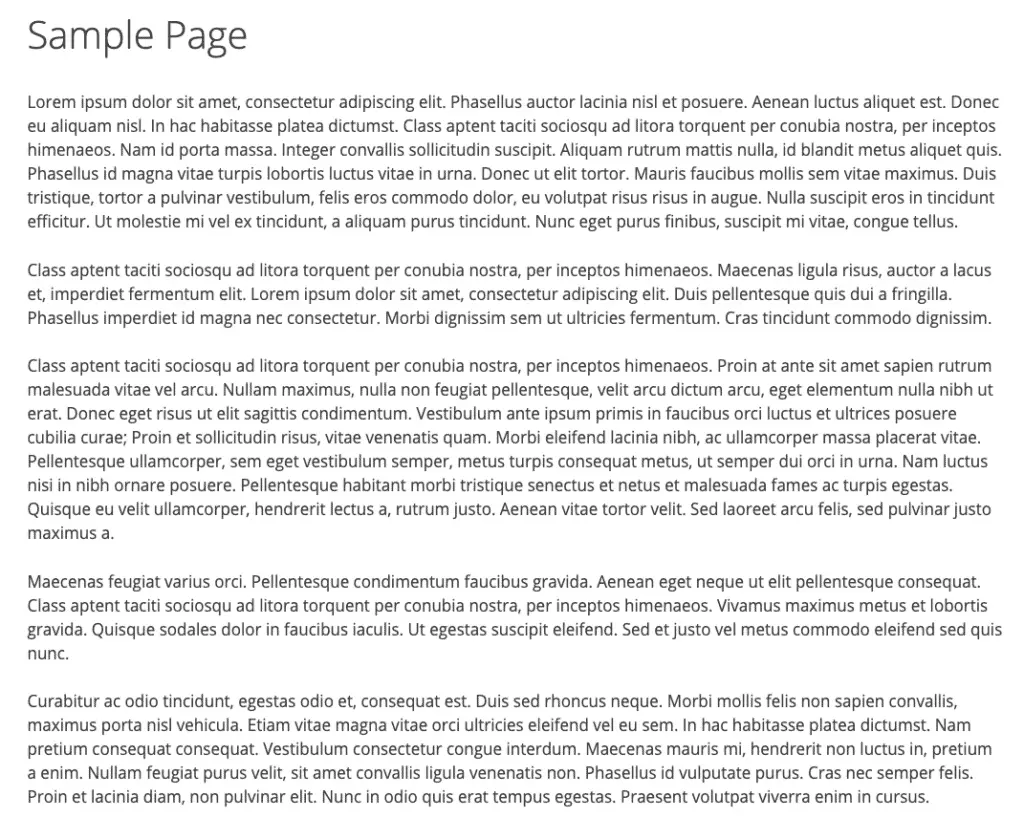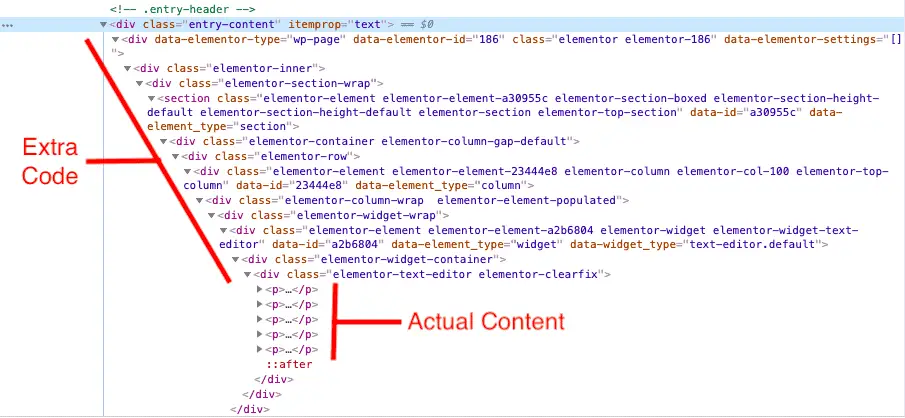Let’s be clear on one thing. All Page Builder plugins, including Elementor, will affect SEO to some extent. So, can we still call Elementor SEO friendly?
Elementor outputs more code per page than a typical page built with the WordPress Editor. This extra code increases the page size and decreases the page speed. So Elementor does have some effect on SEO because page speed is considered to be one of the ranking factors of Search Engines.
So does this mean that you should stop using Elementor?
No, not at all.
Let’s see why…
How Elementor Affects SEO?
The most significant impact that Elementor can have on SEO is on the page load speed. And this is true for all WordPress Page Builder plugins, not just Elementor. But, for the sake of this discussion, let’s stick with Elementor.
Typically, a page built with Elementor will output more code than a page built without Elementor.
For example, if you build a simple page as shown below…
Here’s the code output of that page when it is built with the core WordPress Editor…
And here’s the code output of the same page when it is built with Elementor…
As you can see, Elementor outputs a lot of code per page than a standard WordPress page does.
This means that your web server will have to do more work to load that page.
This, in turn, will affect your website speed, which will affect the SEO of your website.
Now, this is all theory.
In reality, you need to find out what the actual difference in speed is between the page built without Elementor and with Elementor.
If the difference is negligible, then you can consider using Elementor because of the convenience it offers to build good-looking web pages.
So, let’s check the page speeds now…
How Elementor Affects Page Speed?
As you just saw, Elementor does output more code as opposed to a standard WordPress page.
So theoretically, a page built with Elementor should take more time to load.
I tested the same two pages from above with Pingdom Tools, and here’s what I found…
I ran the speed test 3 times, and here are the results…
For the page built with the core WordPress Editor, these were the statistics:
Performance Grade Load Time Page Size Requests
| Performance Grade | Load Time | Page Size | Requests |
| A(91) | 337 ms | 111.1 KB | 18 |
| A(91) | 217 ms | 111.1 KB | 18 |
| A(91) | 217 ms | 111.1 KB | 18 |
And for the page built with Elementor, these were the statistics:
| Performance Grade | Load Time | Page Size | Requests |
| B(85) | 575 ms | 291.7 KB | 33 |
| B(85) | 332 ms | 291.7 KB | 33 |
| B(85) | 332 ms | 291.7 KB | 33 |
So, the page built without Elementor scored a grade of A(91) and took 257 milliseconds to load on an average.
While the page built with Elementor scored a grade of B(85) and took 413 milliseconds to load on an average.
That means, the page built with Elementor took 156 milliseconds more to load. That’s a decrease of 60.7% in page speed.
Also, Elementor increased the page size from 111.1 KB to 291.7 KB, which is an increase of 180.6 KB. In other words, Elementor increased the page size by 262.5%.
As you can see, a page built with Elementor will take more time to load than a page created with the core WordPress editor.
And the difference in speed and page size is notable.
So Elementor will definitely affect SEO to an extent where page speed is concerned.
Now, do keep in mind that the page I tested had only one Elementor widget on it. If you build a page with more Elementor widgets, then you might see an even bigger difference in page speed and size.
So you are better off using less number of Elementor widgets to build a page.
But this isn’t practical at all.
You are going to use Elementor so that you can jazz up the design of your page. Without using several Elementor widgets, it is difficult to build a page that looks great.
This brings up the next question…
On Which Pages Should You Use Elementor?
I would say that you can use Elementor on all pages that you are not actively trying to rank on Search Engines.
That means you should never use Elementor on your blog posts, if you are trying to rank them on Search Engines.
But what about the Home, About, Blog, Category, etc. pages.
Let’s be realistic.
It is rare that you will want to rank your Blog, Category, and Tag pages. So you can use Elementor on them.
Now, the Home page is something that you will want to rank.
And a Home page usually should look great.
WordPress, in its current state, cannot build a good-looking Home page for you.
And it is critical that your Home page looks good. So you should definitely consider using Elementor on your Home page.
The decrease in page speed is far less critical than someone landing on a shabby looking Home page and bouncing right-off without becoming a customer.
What about Sales pages?
The same thing applies to Sales pages as well.
Will you buy from a shabby-looking Sales page?
I wouldn’t.
So what’s the point in trying to gain page speed at the cost of losing a customer?
There’s none.
That is why I think you should consider using Elementor on Sales pages.
Now…
Is Elementor The Only Culprit Page Builder?
No!
Actually, Elementor is far better than most other page builder plugins when it comes to page speed.
There are many other page builder plugins that are far worse than Elementor when it comes to code output and page speed.
So you are good to use Elementor.
However, do keep in mind that you should use it judiciously.
Don’t go overboard and use Elementor on every single page of your website.
Content pages, like blog posts, should always be built without using any page builder plugins.
Other pages that need to look great to convert website visitors into customers can be built with page builder plugins, like Elementor.
Now…
Something More Important Than SEO Friendliness Of Elementor!
When using Elementor, you should be more worried about the safety and security of your website than SEO friendliness.
Elementor has put millions of sites at risk in the past. You can read more about this over here and over here.
So the SEO-friendliness of Elementor should be the least of your worries.
I am using another page builder since 2014 just because of this one reason, Security!
But if you have to use Elementor, then be on top of your website security at all times.
You don’t want your site getting hacked because of some WordPress plugin that you are using on only a fraction of your website pages.
With that said…
Interesting Further Reading:
- Does Elementor Use Shortcodes? Actually No – Here’s How It Works
- 2 Easy Ways To Embed A PDF In Elementor Without Writing Code
- How To Add Alt Text To Images In Elementor? (Step-by-Step)
- 2 Ways To Add A Phone Number In Elementor And Make It Clickable
- How To Link A Button Or A Page To Another Page In Elementor?
Final Thoughts!
Elementor is a great page builder plugin and is SEO friendly to an extent. You can use it on some pages of your website.
But Elementor does lack on the security aspect.
If you decide to use Elementor, then make sure that you update it regularly as and when new versions of Elementor are released.


